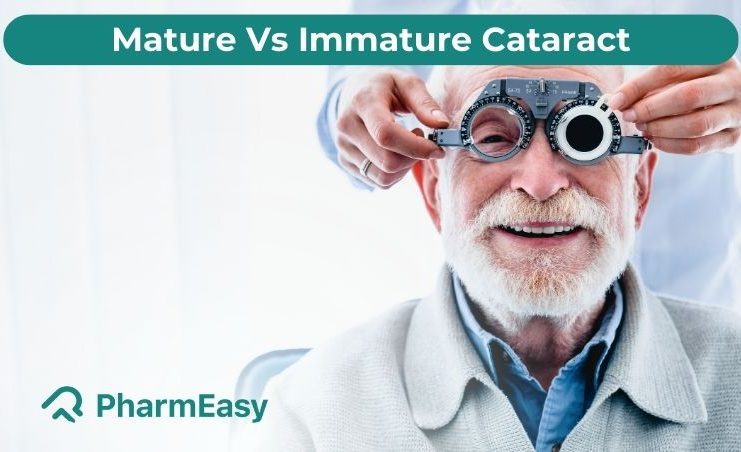Difference Between Mature And Immature Cataract
By Dr. Nikita Toshi +2 more

Get,

to manage your symptom
Get your,


4 Cr+ families
benefitted

OTP sent to 9988776655



You’ve successfully subscribed to receive
doctor-approved tips on
Whatsapp

Get ready to feel your best.

Hi There,



Register to Avail the Offer
Send OTPBy continuing, you agree with our Privacy Policy and Terms and Conditions

Hi There,

Trusted by 4 crore+ families

OTP sent to 9988776655



You have unlocked 25% off on medicines




Code: NU25

By Dr. Nikita Toshi +2 more
Table of Contents
A cataract is called mature when the lens is totally opacified and the pupil appears milky white in colour. The cataract spreads to the edges of the lens in this stage and has a considerable effect on vision. At this stage of the cataract, your quality of life is affected and you may not be able to perform daily activities smoothly. Cataract removal surgery must be considered immediately.

An immature cataract is one in which the eye lens has become cloudy, slightly opaque, in the centre. At this stage, your ophthalmologist may recommend new glasses and anti-glare lenses. Progression of an immature cataract takes up to several years, but you will experience slight discomfort while reading and may ask for increased light.
For the vast majority of patients, cataract surgery is not urgent and can be safely delayed until the patient wishes to undergo the same. Even though it doesn’t cause harm to the eye, the vision gradually reduces until the cataract is removed surgically.
Dr Ashish Bajaj – M.B.B.S, M.D. in Clinical Pharmacology and Toxicology
| Different Factors | Mature Cataract | Immature Cataract |
| Causes | Increased age Excessive alcohol consumption Family history of cataracts Untreated cataract in the early stages | Ageing Injury Inherited genetic disorders Past eye surgery or medical conditions such as diabetes, high blood pressure. Long-term use of steroid medications. Smoking Excessive exposure to sunlight Radiation treatment in the upper body |
| Symptoms | Impaired vision Visible white spot in the eye No iris shadow No red reflex | Partially impaired A slowly progressing white spotIris shadow Plane mirror examination – Black opacity against red background |
| Diagnosis | Eye examination includes: Purkinje images testing: These are reflections from light, particularly infrared (IR) light, of the eye. All four Purkinje images are absent in this condition. Visual acuity test. Slit-lamp examination Retinal exam to open your pupils wide (dilate) and examine the back of your eyes (retina). Applanation tonometry test to measure fluid pressure in your eye. | All four Purkinje images are present in this condition. |
| Treatment options that can be advised by doctors | Extracapsular cataract surgery is meant for an advanced cataract that might be too dense to break easily. A larger opening is made in the eye to remove the lens in one piece and then the surgeon inserts the new artificial lens. | Change in eyeglasses or lens Phacoemulsification cataract surgery the most common procedure in which the ophthalmologist makes a small opening in the eye to use (ultrasound) or a laser and breaks the lens. The fragments of the lens are removed and a new plastic lens is placed. |
| Prevalence | Age-related cataracts typically progress and matures after age 55, | Younger patients, including some infants at birth, may have cataracts. People aged 40-50 develop immature cataracts in one or both eyes. |
| Complications | Affects your daily life and interferes with normal activities like driving a car or watching television. Chances of complete vision loss | Worsening vision Leads to mature cataract |
A Mature cataract is a cataract that is opaque, totally obscuring the red reflex. It is either white or brunescent. While an Immature cataract is a cataract characterized by a variable amount of opacification present in certain areas of the lens. Both require surgery.
Dr. M.G. Kartheeka – MBBS, MD(Pediatrics)
The difference between mature and immature cataracts is not very easy to define; it is possible for you to confuse the two conditions as their symptoms are very similar. It is important to consult an ophthalmologist to get your condition diagnosed properly. If you suffer from an immature cataract, it is best to discuss surgery so that the condition doesn’t progress and leads to a mature cataract over time. Never self-medicate if you have any of these two conditions, as it may cause other health complications or worsen your condition.
Disclaimer: The information included on this site is for educational purposes only and is not intended to be a substitute for medical treatment by a healthcare professional. Because of unique individual needs, the reader should consult their physician to determine the appropriateness of the information for the reader’s situation.

Leave your comment...
Comments